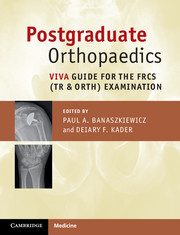Book contents
- Frontmatter
- Contents
- List of Contributors
- Foreword
- Preface
- Section 1 The FRCS (Tr & Orth) Oral Examination
- Section 2 Adult Elective Orthopaedics and Spine
- Section 3 Trauma
- Section 4 Hand and Upper Limb/Children's Orthopaedics
- Section 5 Applied Basic Science
- Section 6 Diagrams for the FRCS (Tr & Orth)
- Index
- Plate Section
Foreword
Published online by Cambridge University Press: 05 November 2012
- Frontmatter
- Contents
- List of Contributors
- Foreword
- Preface
- Section 1 The FRCS (Tr & Orth) Oral Examination
- Section 2 Adult Elective Orthopaedics and Spine
- Section 3 Trauma
- Section 4 Hand and Upper Limb/Children's Orthopaedics
- Section 5 Applied Basic Science
- Section 6 Diagrams for the FRCS (Tr & Orth)
- Index
- Plate Section
Summary
Exam success depends as much upon technique as it does upon knowledge. In this respect Postgraduate Orthopaedics: Viva Guide for the FRCS (Tr & Orth) Examination is a logical and, no doubt will become, a most welcome addition to the highly successful text, Postgraduate Orthopaedics. Its strength relies on the first-hand experience of surgeons who have recently sat and successfully passed the FRCS (Tr & Orth) examination. Each chapter has a totally different feel, in part due to the topics covered, but more importantly to the style with which each of the viva scenarios has been written. This eclectic approach keeps the text refreshing and also reflects the personal experiences of candidates undergoing the stress of this examination; sentiments that a heavily edited text would have lost.
I also like the first chapter that attempts to remove much of the mystique from the viva process and helps candidates to benchmark just what is expected of them to pass this examination.
I only wish that texts like this had been available in my day since so many of us struggled to come to terms with what the exam was all about and made the mistake of thinking that pure knowledge of orthopaedics was the key to success: if only!
- Type
- Chapter
- Information
- Postgraduate OrthopaedicsViva Guide for the FRCS (Tr & Orth) Examination, pp. viiiPublisher: Cambridge University PressPrint publication year: 2012



